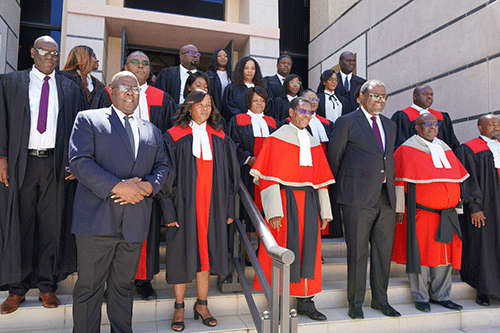President Hage Geingob has implored the Judiciary to find other means to improve justice for all.
The President said this yesterday while officially opening the 2023 legal year at the Supreme Court of Namibia.
“I wish to implore the Judiciary to explore various alternative dispute settlement mechanisms to alleviate the caseload in the court roll and mitigate against prohibitive legal costs which is a big stumbling block to the majority of Namibians to have reasonable access to justice,” he advised.
While he commended the Judiciary for establishing the court-guided mediation process, he urged the line ministry and the Judiciary to urgently address the need for improved accessibility to legal services, especially for persons with disabilities through the incorporation of Braille and sign language services.
Furthermore, Geingob said the legal fraternity should, as a matter of urgency, review its fees and evaluate the affordability thereof within the confines of its governance framework.
Similarly, he said, the promotion of the culture of pro bono work would go a long way toward improving access to justice.
The President also warned that fiscal space will remain seriously constrained and budget cuts will be maintained and he thus said that doing more with less will remain the norm.
The event was graced by Cabinet members, judges of the High and Supreme courts and other members of the legal fraternity.
On his part, Chief Justice Peter Shivute bemoaned the lack of funding needed to fulfil the mandate of the Judiciary, saying funds allocated to the Judiciary do not always match what is reasonably required.
Another setback, Shivute noted, was that no budgetary provision was made for the filling of critical vacant posts for judicial officers and staff members.
This, he said, affects its ability to render improved services to members of the public.
“The majority of these vacant positions are at the lower courts, which severely impacts its ability to render sufficient services to the public,” the chief justice stated.
According to him, as of December 2022, 253 posts were vacant, of which 50% are at the lower courts.
“This is worrisome because the magistrates’ courts are primarily the courts of first instance as is the High Court. That is inherently labour intensive and time-consuming and the fewer judicial officers and support staff there are, the fewer cases can be dealt with.”
However, the chief justice said, progress was made with the construction, renovation and rehabilitation of existing courthouses and facilities across the country.
“But although good progress was registered in expanding and maintaining capital infrastructure, the need for construction of new courthouses and upgrading and renovating existing ones remains a priority which needs funds.”
According to the Shivute, the performance of the lower courts has not been improved appreciably.
He said to see a reduction in the pending cases, more magistrates are needed, more courtrooms, more support staff and sufficient funds.
Shivute said that the lower court consists of nine regional courts, 37 district courts and 35 periodical courts all across Namibia and deals with a wide range of criminal, civil, maintenance and domestic violence cases.
The magistracy is also responsible for a multitude of agency services on behalf of other ministries, such as attending to the solemnisation of marriages and granting temporary and permanent liquor licences.
It dealt with 64 536 cases during the year under review, which shows an increase of 10.4% from the previous year, the chief justice stated.
A total of 26 756 cases were finalised which compares to 9 065 cases more than in the previous year and as a result, 37 983 cases were carried over to this year.
According to Shivute, although financial restraints negatively impact the work of the Judiciary, there is a tremendous desire among all members of the Judiciary and the support staff to do better to serve the nation, if only they could have sufficient resources to fulfil their constitutional mandate.


